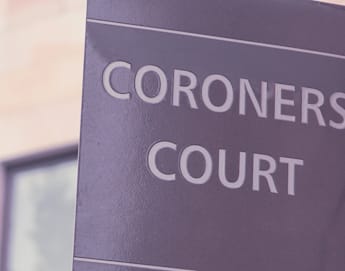Coroners and Inquests
Fieldfisher's personal injury and medical negligence team act for the families of those killed in accidents at work, on the roads and railways, as a result of medical negligence and asbestos exposure. Part of our work is to support families through the often difficult process of an inquest. This may involve giving evidence as a witness or making a personal statement about the deceased. To speak with one of our inquest solicitors call 0800 358 3848 or complete our online enquiry form.

Although stressful, an inquest should provide grieving families with important information about how someone died. In summing up, the coroner may highlight failings to prevent future deaths and make recommendations to parties involved which must be addressed.
We can help you contribute to the inquest to best support your interests and, where appropriate, to call those responsible to account. The outcome of an inquest often benefits any ongoing civil claim for compensation.
What we do
We will visit you at home and ensure your case is investigated thoroughly and professionally. We will explain each step of the inquest process as part of our work on your claim.
Please read our guide to inquests brochure for more information on what to expect from an inquest and how to achieve the best outcome.
Our solicitors specialise in fatal accident claims
If you have suffered a bereavement as a result of some medical negligence, for example a road collision or at work, the deceased's financial dependents may be able to claim for the subsequent loss of financial support.
We pride ourselves on doing everything possible to make a claim as straightforward and stress free as possible.
We specialise in complex and high-value claims, quantifying financial dependency and the loss of services the deceased would have given the family.
We may also be able to arrange for you to be represented at inquest.
Who can claim?
A dependent is defined as:
-
A wife, husband, ex-wife or ex-husband of the deceased
- A civil partner or former civil partner of the deceased (living with the deceased for at least two years)
- A child of the deceased
- Any person (not being a child of the deceased) who was treated by the deceased as a child of the family
- A parent of the deceased
- A sibling, uncle, aunt, niece, nephew or cousin of the deceased
- A cohabitee may also be able to claim
What can you claim?
You can claim damages under 2 separate Acts:
Under the Law Reform (Miscellaneous Provisions) Act, you can claim:
- Pain, suffering and loss of amenity (from the date of injury to the date of death)
- Special damages (from the date of injury up to the date of death) including loss or earnings, medical expenses and treatment, damage to clothing and property, care (professional or gratuitous) and travel expenses.
- Funeral expenses
- Probate fees
- One-off expenses and losses
Under the Fatal Accidents Act, you can claim:
- A statutory bereavement award
- A dependency claim for the financial losses suffered by the dependents of the deceased
- A claim for the funeral expenses, if paid by the dependents
Statutory bereavement award
If the deceased was your wife, husband, civil partner or child (under the age of 18) at the date of death, you are eligible for a fixed sum of £12,980. This is paid in addition to any dependency claim.
The Government is currently considering proposals to bring the rights of cohabitees in line with those who are married, under the Human Rights Act 1998. Currently, a long-term partner can claim many of the same items under the Fatal Accident Act as a bereaved spouse, but not the Statutory Bereavement Award – i.e. would receive £12,980 less than a married person in a successful civil claim.
Recent inquests
Browse our recent inquests.
Our inquest solicitors
Our award-winning team believes in putting clients first. We are dedicated to achieving the best results possible and pride ourselves on our sensitive approach. Any of our inquest solicitors below will be pleased to discuss your case and offer free advice over the phone.
-
Head of Personal Injury and Medical Negligence
Iona Meeres-Young
-
London, England
- 0330 460 6769
- Email Iona
-
-
Partner, Head of Serious Injury Sector
Jill Greenfield
-
London, England
- 0330 460 6778
- Email Jill
-
-
Partner, Head of Asbestos Claims
Peter Williams
-
Partner
Keith Barrett
-
London, England
- 0330 460 6783
- Email Keith
-
-
Partner
Mark Bowman
-
Partner
Jennifer Buchanan
-
London, England
- 0330 460 6774
- Email Jennifer
-
-
Partner
Ian Christian
-
London, England
- 0330 460 6514
- Email Ian
-
-
Partner
Samantha Critchley
-
London, England
- 0330 460 6812
- Email Samantha
-
-
Partner
Keith Cundall
-
Manchester, England
- 0330 460 7381
- Email Keith
-
-
Partner
Nick Godwin
-
London, England
- 0330 460 7204
- Email Nick
-
-
Partner
Julia Hamilton
-
Manchester, England
- 0330 460 6780
- Email Julia
-
-
Partner
Lindsay Holt
-
Manchester, England
- 0330 460 6789
- Email Lindsay
-
-
Partner
Claire Horton
-
Manchester, England
- 0330 460 6748
- Email Claire
-
-
Partner
Paul McNeil
-
Partner
Dushal Mehta
-
Partner
Andrew Morgan
-
Partner
Shivi Nathan
-
London, England
- 0330 460 7160
- Email Shivi
-
-
Partner
Kate Rohde
-
London, England
- 0330 460 6781
- Email Kate
-
-
Partner
Arti Shah
-
London, England
- 0330 460 6739
- Email Arti
-
-
Partner
Helen Thompson
-
London, England
- 0330 460 6765
- Email Helen
-
-
Partner
Jenny Urwin
-
Manchester, England
- 0330 460 6776
- Email Jenny
-
-
Partner
Jane Weakley
-
London, England
- 0330 460 6773
- Email Jane
-
-
Partner
Jonathan Zimmern
-
London, England
- 0330 460 6779
- Email Jonathan
-
-
Director
Marcos Eleftheriou
-
London, England
- 0330 460 6352
- Email Marcos
-
-
Director
Claire Glasgow
-
London, England
- 0330 460 6747
- Email Claire
-
-
Director
Caron Heyes
-
London, England
- 0330 460 6743
- Email Caron
-
-
Director
Will Jones
-
London, England
- 0330 460 6822
- Email Will
-
-
Director
Harvinder Kaur
-
London, England
- 0330 460 6762
- Email Harvinder
-
-
Director
Deborah Nadel
-
London, England
- 0330 460 6750
- Email Deborah
-
-
Director
Punam Sood
-
London, England
- 0330 460 5952
- Email Punam
-
-
Senior Associate
Sevim Ahmet
-
Senior Associate
Suzanne Farg
-
London, England
- 0330 460 6819
- Email Suzanne
-
-
Senior Associate
Christina Gardiner
-
London, England
- 0330 460 6746
- Email Christina
-
-
Senior Associate
Emma Kendall
-
London, England
- 0330 460 6755
- Email Emma
-
-
Senior Associate
Rachel Morgan
-
London, England
- 0330 460 6608
- Email Rachel
-
-
Senior Associate
Nilam Patel
-
London, England
- 0330 460 6801
- Email Nilam
-
-
Associate
Lewis Ayre
-
London, England
- 0330 460 6788
- Email Lewis
-
-
Associate
Adam Curry
-
London, England
- 0330 460 6367
- Email Adam
-
-
Associate
Rebecca Drew
-
Associate
Libby Ferrier
-
London, England
- 0330 460 7178
- Email Libby
-
-
Associate
Gabriella Gooday
-
London, England
- 0330 460 6758
- Email Gabriella
-
-
Associate
Jamie Green
-
London, England
- 0330 460 6771
- Email Jamie
-
-
Associate
Emma Hall
-
London, England
- 0330 460 6754
- Email Emma
-
-
Associate
Eman Hassan
-
London, England
- 0330 460 6753
- Email Eman
-
-
Associate
Sarah Kingsley Fried
-
London, England
- 0330 460 6815
- Email Sarah
-
-
Associate
Carley Ross
-
London, England
- 0330 460 6838
- Email Carley
-
-
Associate
Jack Sales
-
London, England
- 0330 460 7328
- Email Jack
-
-
Associate
Gemma Wells
-
London, England
- 0330 460 6549
- Email Gemma
-
-
Solicitor
Louise Astill
-
London, England
- 0330 460 6147
- Email Louise
-
-
Solicitor
Heidi Brotherton
-
Manchester, England
- 0330 460 6763
- Email Heidi
-
-
Solicitor
Francesca Farrelly
-
Manchester, England
- 0330 460 5917
- Email Francesca
-
-
Solicitor
Mona Gholami
-
London, England
- 0330 460 6752
- Email Mona
-
-
Solicitor
Jennifer Kelly
-
London, England
- 0330 460 6775
- Email Jennifer
-
-
Solicitor
Francesca Krauze
-
London, England
- 0330 460 6512
- Email Francesca
-
-
Solicitor
Mikhail Popov
-
London, England
- 0330 460 7236
- Email Mikhail
-
-
Solicitor
Harriet Salvesen-Sawh
-
London, England
- 0330 460 6761
- Email Harriet
-
-
Solicitor
Satvir Sokhi
-
London, England
- 0330 460 7393
- Email Satvir
-
-
Solicitor
Ella Thornton
-
Manchester, England
- 0330 460 7214
- Email Ella
-
-
Solicitor
Charlotte Thorpe
-
Legal Executive
Henry Kirwan
-
London, England
- 0330 460 6766
- Email Henry
-
-
Chartered Legal Executive
Marlena Mistak
-
London, England
- 0330 460 6795
- Email Marlena
-
-
Solicitor Apprentice
Jess Gurzynski
-
London, England
- 0330 460 6777
- Email Jess
-
-
Solicitor Apprentice
Amba Minhas
-
London, England
- 0330 460 7124
- Email Amba
-
Recent news and insights
Coroners and inquests frequently asked questions
Coroners have been with us in one form or another since the 12th Century.
Over the centuries Coroners have exercised many powers on behalf of the Crown, mainly relating to taxation and declarations of “treasure trove”. But even since those earliest times the Coroner has had the responsibility of establishing the cause of any unexplained death, wherever there may have been a “breach of the King’s peace”. However, It is not the Coroner’s role to establish who was at ‘fault’ but simply to establish what happened and to give his verdict accordingly.
Over time the role has evolved, and it continues to evolve, but the system in place today is broadly the same as that established by The Coroners Act of 1887.
Representation by lawyers at a hearing might raise issues or might uncover evidence which is valuable to the family.
This might simply help the family understand what has happened and might help in a later compensation claim. The family may be able to influence the question that the coroner asks or the evidence that he calls for. This is where legal representation can be very helpful, as we can guide and help you focus on the right questions to ask.
It is important for families to understand what caused the death and, where possible, to call those responsible to account. We will guide you through the Inquest process, by representing you when you need it and by claiming compensation where we can - money is no answer to sudden bereavement but neither is it acceptable for families to suffer the double injustice of financial loss when that can be avoided.
A post-mortem examination can provide new and unexpected medical information about the cause of death. That information may be relevant to any compensation claim. When a claim has begun it is important that the defendant is informed of the death and is given the Coroner’s details. If the Defendant is not given the opportunity to obtain relevant medical information then the civil court might not allow any compensation claim to be made at all; especially where lung cancer is involved.

Awards and recognition
We are recognised in all the leading legal directories and regularly win industry awards for our work with clients.
Contact us
For a free, no obligation call with one of our inquest solicitors, please dial 0800 358 3848 or complete our online enquiry form.













































































































